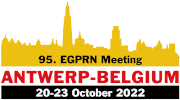Are immigrants living in France more reluctant to receive vaccines than native-born French citizens? findings from the national health Barometer study
Sohela Moussaoui, Nicolas Vignier
Keywords: Hesitancy Vaccine Immunization Migrants
Background:
France is one of the world’s most vaccine hesitant countries and vaccine hesitancy (VH) is
considered one of the world’s leading threats to global health. However, little is known about VH in
immigrant populations in France. Using data from the 2016 Health Barometer, we examined VH among
newcomers, more established immigrants, and the native-born population in France.
Research questions:
What is the prevalence of VH among immigrants in France?
Is the length of time since first arrival in France associated with attitudes towards vaccination?
Method:
Data was collected from French speaking individuals aged from 15 to 75 years old, residing in
France. Individuals were selected through randomly generated landline and mobile phone numbers.
Vaccine hesitancy was assessed through four questions and a ‘‘time spent in France” variable was created,
using the year of arrival in France. Associations were studied using logistic regression.
Results:
A sample of 15,216 participants residing in France included 1,524 foreign-born immigrants and
13,692 native-born individuals, with a mean age of 46-years. Most participants (75.7%) reported being
favorable to vaccination regardless of country of origin but immigrants were less hesitant toward vaccinations
than the host population. Foreign-born immigrants from North Africa had the most favorable
views whereas those from sub-Saharan Africa held most unfavorable views on vaccination. With time
spent in France, the opinions towards vaccination became more negative (aOR = 0.57, 95 %CI [0.40–
0.79], p = 0.001) and the risk of vaccine refusal (aOR = 2.34, 95 %CI [1.45 – 3.78] p = 0.001) and reluctant
acceptance of vaccines increased (aOR = 1.89 95 %CI [1.20 – 2.99], p = 0.006).Foreign-born individuals
with the longest residency in France had more negative opinions than native-born individuals, regardless
of region of origin.
Conclusions:
Immigrants were less hesitant toward vaccinations than the host population, but vaccine
hesitancy increased with time spent in France.
Points for discussion:
Acculturation: This study found that the more time spent in France after an immigrant’s first arrival, the more their opinions on vaccine safety and efficacy became negative.
Determinants of vaccine hesitancy: Native-born individuals appeared to have a greater distrust toward information on vaccines provided by the Ministry of Health than foreign-born individuals, whereas the majority of both groups reported trusting the information given on vaccines by physicians.

